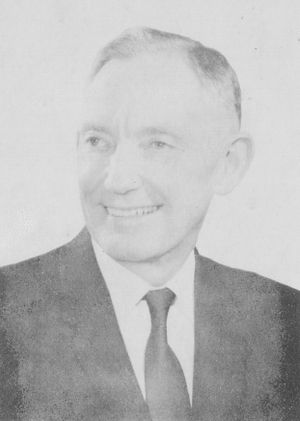Hugh H. Skilling
- Associated organizations
- Stanford University
- Awards
- IEEE James H. Mulligan, Jr. Education Medal
Biography
Hugh Hildreth Skilling, after a long and illustrious career as an eminent administrator, an inspiring and dedicated teacher, and a writer of superb, trendsetting electrical engineering textbooks, should not be considered today as having yet completed his contribution to engineering education. Choosing to resign as Executive Head of the Department of Electrical Engineering at Stanford University, a post he held for 23 years, in order to devote his full time to teaching and writing after his from sabbatical leave in late 1965, he will continue unabated to enrich the best traditions of his profession.
He began his teaching career as a Teaching Assistant in physics at Stanford in 1926 while working on his Bachelor's degree in mechanical engineering, awarded "With Distinction" that same year. The following year he received the Engineer's degree in electrical engineering and became a member of Phi Beta Kappa and Sigma Xi. He took his S.M. in electrical engineering at MIT in 1930 and returned to Stanford to teach and earn his Ph.D. in electrical engineering. This was awarded in 1931, at which time he was honored as a University Fellow. This was the year he began his production of the papers, articles, and in particular, textbooks which over the years have marked him as an outstanding educator. Their unique clarity, which in the opinions of other leaders in the field is unparalleled, has provided understanding for unnumbered electrical engineering students, and faculty, in this country and abroad. His responsibilities of administering a department which grew under his guidance from a faculty of six to one of 45 graduating more Ph.D.'s per year than any other electrical engineering department in the country, did not prevent him from completing a new textbook each five years, each in a different area, each noted for its masterfully lucid presentation of difficult technical concepts. His Fundamentals of Electric Waves and his Electrical Engineering Circuits particularly have been landmarks in the history of electrical engineering texts, books that have followed were different from the books that preceded, at least in part because of the stimulating effect and wide adoption of these two.
Effective as he has been as an educator through his books, Dr. Skilling has continued also from his earliest years in teaching to exert his influence through direct interaction with students. He initiated a teaching seminar with practice teaching courses in electrical engineering at Stanford which was designed to instruct Ph.D. candidates on how to teach. This course of training continues, and its success in educating educators is evidenced by the many young professors of electrical engineering in the country who graduated from his department. Throughout his years as administrator, he has made a point of keeping in personal contact by giving at least one course each quarter, which was made possible only by delegating some of his administrative duties to other faculty members. Nor has he ever last sight of the other side of the teacher-student relationship coin in its personal and human aspect; his concern, and habit, both as administrator and professor has been to decide issues primarily on the basis of the impact the decision would have on the individual student.
As Executive Head of his department, a broader, more indirect legacy to generations of students was his insistence on the acquisition of superior staff members whom he welded in an atmosphere of creative freedom into an internationally renowned community of educators and research scientists. Within the Stanford framework, he served on a committee that revised the general education program for Stanford undergraduates, the faculty Executive Committee, the Committee on University Policy, and was on the Advisory Board, a very small group elected by the faculty that reviews new appointments and advises the President on policy matters.
In ever-widening circles of activity, he served as a Supervisor of the U.S. Army Signal Corps Radio Training Program in 1942-43, and as Assistant Director of the Engineering Unit, Army Specialized Training Program in 1942-44. He has been Consulting Editor of electrical engineering textbooks for John Wiley & Sons since 1958. He was in charge of the engineering portion of the contract Stanford had for several years after World War II which was upgraded by the faculty and curricula of the University of the Philippines, and was the consultant chosen by Dartmouth University in the late 1950's to reorganize the curricula of its Department of Electrical Engineering. He has been a member of many inspection teams in connection with the accreditation of curricula of engineering schools by the Engineer's Council for Professional Development.
Notwithstanding the demands of the many professional interests and activities on numerous national and regional committees of AIEE and other professional societies, he has developed a broad range of personal interests, one of which is his discriminating collection of Chinese art objects. This grew out of his residence years ago in China where he learned an active appreciation of that ancient culture which he has pursued enthusiastically ever since. His unique personal combination of all that is meant in "gentleman and scholar" has produced in his unique style the outstanding educator in electrical engineering for which the award of the 1965 IEEE James H. Mulligan, Jr. Education Medal honors him.
